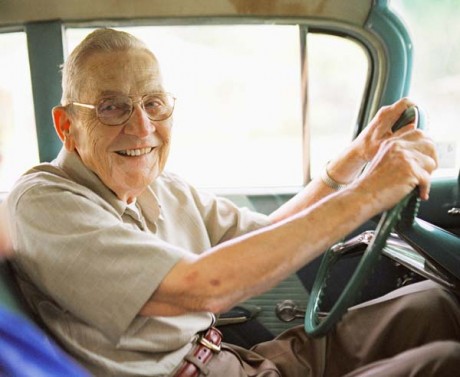Seniors on the road
It’s important to express your concern for their safety
By Carole HowellTo expect that my father will concede cheerfully when he can no longer safely drive himself is simple naïveté on my part. I expect that if the day comes when I must take the keys away, it will spark the onset of Armageddon, or at the very least, the next great world conflict.
He has faced this dilemma with his own older siblings, so it's only rational that he would understand my concern. In my delusional state, Dad will be understanding and cooperative. In reality, however, my father is often irrational as well as stubborn.
"I may not be able to walk so well," he tells me, "but driving is something I do very well." He just doesn't want to talk about it. Period.
Stunning statistics
For now, he's right, but for many other seniors, and their family members, the statistics can stun even the most irrational. Nationwide, older motorists are involved in a disproportionately high share of deadly crashes. In North Carolina, 16 percent of drivers are 65 or older. In 2010, 232 were involved in 18 percent of crashes resulting in fatalities and 153 of those fatalities were the seniors themselves. (Data provided by Tripnet, a non-profit transportation research group.)
We've heard stories of seniors who have driven through a storefront when mistaking the gas for the brake. Some seniors have been known to leave for their neighborhood grocery store only to be found lost and disoriented hours later. In a worst-case scenario, an older driver dies in a crash that takes other lives as well.
Yet to many seniors, loss of driving privileges signals an end to independence and control, and this can be a devastating blow.
A spouse is often the first to notice unsafe driving behavior, unexplained damage to the car, or forgetfulness. Many times questions are raised when law enforcement investigates a fender-bender or observations that could be related to health problems such as slow reaction time and falling asleep.
North Carolina supports safety
Reports funneled to the North Carolina Division of Motor Vehicles often trigger an evaluation and driving test. In North Carolina, anyone can refer a driver to the state's evaluation program that usually begins with a visit and assessment by the driver's own physician or a certified driving evaluator.
According to Ed Herbster, an occupational therapist and certified driving evaluator at CarePartners in Asheville, normal aging with its decreased reaction times contributes to senior driving safety. Conditions like dementia and Alzheimer's disease raise obvious red flags, but, age-related problems like heart disease, glaucoma, hypertension, cataracts, diabetes or blood sugar problems, blackouts and sleep disorders can also contribute to decreased ability behind the wheel.
An experienced evaluator first conducts an interview. A road test, usually lasting about an hour and a half, allows the evaluator to observe reaction times, visual acuity, hearing ability, and whether the driver is using turn signals correctly and checking their blind spots.
"With adaptive equipment such as larger mirrors or hearing aids, even some drivers who have suffered mild strokes can stay on the road longer," says Herbster. "Simply taking medications as prescribed can be a way to control driving problems. Understanding the symptoms of a medical condition or side effects of medications can help a senior driver understand when they need to call for a ride. You can see how that's positive news for some seniors."
"The most difficult cases occur when the senior is blindsided with the news that their keys will be taken away," he says. "It works best to include a physician, a pastor, siblings or other trusted friends when you raise the subject. It's important to express your concern for their safety. It's not a punishment to take the keys away. You are truly looking out for everyone's best interest, including other drivers."
Options for transportation include private and public transportation, taxi services, friends, neighbors, home-health caretakers, and of course the senior's own family. Assisted-living communities always have planned transportation to the physician's office, shopping and events.
-
Share this story:



